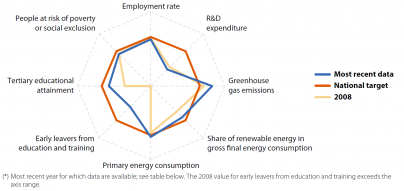Archive:Europe 2020 indicators - Portugal
- Data from June 2017. Most recent data: Further Eurostat information, Main tables. Planned article update: July 2018.
This article is part of a set of statistical articles on Europe 2020 strategy, focusing on the situation in Portugal.

Source: Eurostat (see dedicated web section: Europe 2020 headline indicators)
Explanations on this radar chart are available here.
Main statistical findings

Source: Eurostat (see dedicated web section: Europe 2020 headline indicators)
By 2015, Portugal had reduced its GHG emissions in non-ETS sectors by 23.9 % compared to 1990 levels, remaining well below its target for no more than a 1 % increase by 2020. Since 2011, the country has continuously met its primary energy consumption target. By 2015 the country had reduced the distance to its renewable energy target to three percentage points. Portugal has also achieved a notable reduction in the share of early leavers from education and training, narrowing the gap to its respective target by 20.9 percentage points between 2008 and 2016. Despite a steady increase in tertiary educational attainment since 2010, the country was still 5.4 percentage points away from its respective Europe 2020 target. Portugal’s progress towards its national employment and poverty reduction targets was hit hard by the economic crisis. Although the employment rate has been on a slow upward path since 2014, the country has not been able to close the gap to the Europe 2020 target or to return to its 2008 level. The number of people at risk of poverty or social exclusion would need to be reduced by 208 000 by 2020 for Portugal to meet its national commitment.
Data sources and availability
More information about the origin of the data and the calculation of indicators can be obtained via the Europe 2020 indicators dedicated website.
Under 'Tables', click on the icons next to the indicators:
- 'Explanatory texts (metadata)' for a detailed overview of the collection and compilation methods;
- 'Information on the leaf' for data availability per country.
A more general overview of quality procedures can be found in Implementation of standard reference metadata for indicators - the ESMS Indicator Profile (ESMS-IP) (PDF file).
Context
Europe 2020 is the EU’s agenda for growth and jobs for the current decade. It emphasises smart, sustainable and inclusive growth as a way to strengthen the EU economy and prepare its structure for the challenges of the next decade. The final objective is to deliver high levels of employment, productivity and social cohesion in the Member States, while reducing the impact on the natural environment.
See also
Further Eurostat information
Publications
- Smarter, greener, more inclusive - indicators to support the Europe 2020 strategy (online publication, also downloadable as PDF file
Main tables
Dedicated section
Methodology / Metadata
- Towards robust quality management for European Statistics - Communication from the Commission to the European Parliament and the Council COM(2011) 211 final.
Other information
- Regulation (EC) No 223/2009 of 11 March 2009 on European statistics